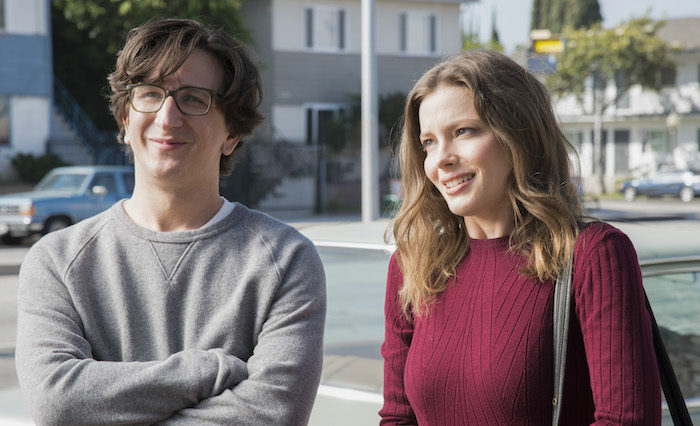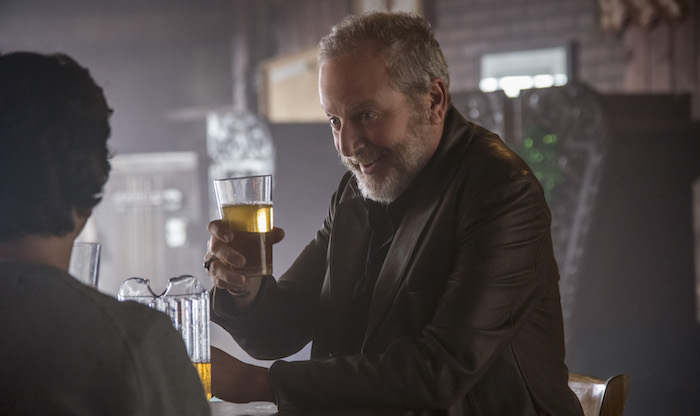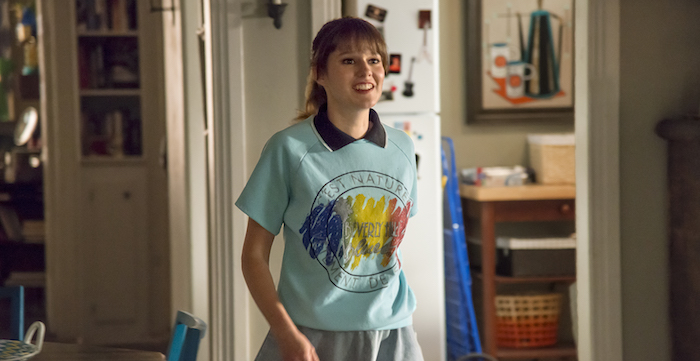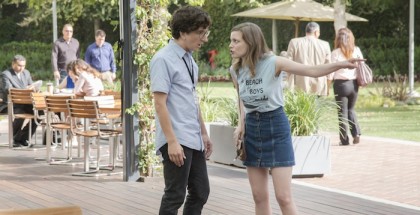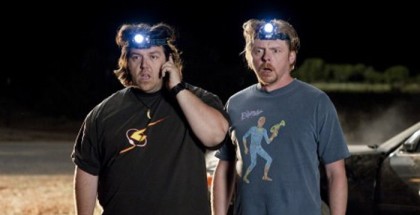Netflix UK TV review: Love Season 2
Review Overview
Laughs
7Pain
8.5Structure
5David Farnor | On 19, Mar 2017
“Sometimes, when I’m in pain, I’m like, ‘Hello, old friend!'” That’s Bertie (Claudia O’Doherty) in Season 2 of Netflix’s Love, and it’s something of a mission statement for the series. Judd Apatow’s romantic comedy won hearts in its first season by being deliberately unromantic, as it introduced us to Gus (Paul Rust) and Mickey (Gillian Jacobs), two people so messed up that it was hard to like either of them, let alone wish for them to get together. That spikiness became oddly endearing in its ability to portray a relationship with a heavy dose of realism. The result was as nasty as it was sweet; the title of the show could easily be “Depression”, “Loneliness” or “Addiction”.
Season 2 picks up directly where we left off, as Gus and Mickey kiss outside his local convenience store – right after she’s told him that she needs a year to get her stuff together before being in a relationship. Apatow, Rust and Lesley Arfin’s scripts excel at making sure that the timing is always off for our central couple: the moment Gus and Mickey decide they shouldn’t be together, they’re forced to spend the night in Gus’ apartment, after the police lock down his neighbourhood. Later, when they want to be together, they’re pulled apart by work, leaving them struggling to overcome the long distance.
It’s a fantastic way to ensure that we still get to spend some time with each of them individually – what made Season 1 of Love so unusual was the way that the show allowed each half of the couple to be defined on their own terms, before putting them together. “Mus” or “Gickey”, this ain’t.
The problem is that after a season in their company, you find yourself wishing you could spend more time with Mickey than Gus. It’s not because Gus is less likeable than her – they’re both believably flawed, often horrible people – but because there’s less substance to him. His storylines carry notably less weight or interest: we see them both out on their own, with Mickey sabotaging a dinner party among married friends by being cruel and Gus undermining a guys-night-out by being rude, but while seeing Mickey trying to help her colleague, Truman, out of his bizarre domestic problems informs her character and generates laughs, watching Gus on the set of Witchita only leaves the show-within-in-a-show teen drama spoof overshadowing him completely. Even a brief encounter with Heidi (the returning and brilliant Briga Heelan) is underwhelming.
With Gus and Mickey now officially an item, the good news is that we get to hang out with them together more than ever – and Episode 5, directed by indie veteran Lynn Shelton, feels like the perfect demonstration of how Love can smooth out those spiky, rough edges with a delightful soft warmth. Beginning with sex, rather than building up to it, the resulting episode is a romantic exchange that doesn’t need tension to keep us tuned in, as we merely relax and enjoy an impromptu day of adventures, including a trip to the beach for Gus, Mickey and Gus’ towel.
A joint trip to a networking drinks event at Mickey’s workplace, on the other hand, sees Gus and Dr. Greg hook up, contrasting that cute glow with fresh, unexpected awkwardness. That’s only topped by a horrific brunch with Mickey’s fly-by-night father – played, with brilliant, hidden nastiness by the legend that is Daniel Stern. (The latter, too, it’s worth noting, are so affecting because of their connection to Mickey more than Gus – another group event, a viewing party for the episode of Witchita [even the spoof name is amazing] that Gus sort-of wrote, tellingly diverts from his narrative to follow Mickey dealing with a cameo from Andy Dick, playing an exaggerated version of himself.)
While it’s nice to have Mickey and Gus in couple mode, though, it leaves Season 2 lacking some of Season 1’s structure and sense of identity: the first run found its momentum in fighting against the rom-com rulebook, forcing two people together even when every sign suggested they wouldn’t fit. Without that convention to subvert, Season 2 feels less, well, unconventional, which was part of the series’ charm. Even the episodes have been trimmed from Season 1’s unwieldy 40-minute runtimes to a more typical half-hour sitcom format.
The result is a programme that flows faster, which is fortunate, because there are episodes here that you’ll want to hurry up – one story based around people tripping on mushrooms is neither funny nor original, while another diversion into high territory between Gus and Arya’s dad is misjudged and dull. Even a climactic chase around the amusingly low-key setting of a farmer’s market feels a little drawn-out, as the show struggles to find a way to close off a subplot involving Mickey’s ex, Randy (Mike Mitchell).
The series’ refusal to conform to a happy ending after Season 1’s ambiguous finale, and its delving into the complex waters of past lovers and rekindled intimacy when the rulebook says Mickey should be looking forward, are great opportunities for Gillian Jacobs to add more layers to her character, always able to find new vulnerabilities to expose in surprisingly raw ways.
That knack for complex female portraits is particularly evident in the show’s work with Bertie, as Claudia O’Doherty quickly becomes the comedy’s MVP. A hilariously shocking rabbit anecdote is just the tip of the iceberg, as she finds herself saddled with a sponging boyfriend to go with her self-centred roommate – and O’Doherty tackles all of the obstacles in Bertie’s way with a winning blend of sincere optimism, naive politeness and, just below the surface, a frankness that can deliver the most astute observations whenever you least expect them. (Watch out, too, for Paula Pell as Mickey’s boss – their interactions are often priceless.)
If Love central’s couple doesn’t always spark the same amount of chemistry the second time around, though, Bertie is a wonderful reminder that the show has lost none of its uncomfortable realism, grounding every glimpse of joy with bursts of unpleasantness. After a superb first season, Love may not be quite as hysterical, novel, or compelling, but it’s certainly just as painful. And that makes it an old friend worth catching up with.
Season 1 to 3 of Love are available on Netflix UK, as part of an £9.99 monthly subscription.


